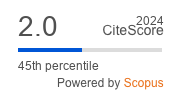An Exploration on the effectiveness of face-to-face and virtual meetings in educational projects dealing with impact innovation
DOI:
https://doi.org/10.23726/cij.2023.1415Keywords:
online, face-to-face, meetings, projects, effectiveness, impact innovationAbstract
Which is the most effective format for meetings in a project dealing with impact innovation? This paper presents the results of a survey amongst 42 business school students experiencing face-to-face or virtual meetings during their MBA classes. Qualitative interviews and a personality test clarify the results. A significant majority of students rated face-to-face meetings as more effective for the ideation phase of the projects, which contains predominantly brainstorming. The results show no clear tendency for the phase of research and preparation for the final assignment as well as for a written report. For presentations, the majority considers face-to-face meetings as more effective.
References
Anderson, N., Potočnik, K., Zhou, J., 2014, Innovation and Creativity in Organizations: A State-of-the-Science Review, Prospective Commentary, and Guiding Framework, Journal of Management, 40(5): 1297–1333. https://doi.org/10.1177/0149206314527128
Autio, E, Kenney, M, Mustar, P, Siegel, D, Wright, M, 2014, Entrepreneurial innovation: The importance of context, Research Policy, 43(7): 1097–1108. https://doi.org/10.1016/j.respol.2014.01.015
Barrero, JM, Bloom, N, Davis, S, 2021, Why Working from Home Will Stick, National Bureau of Economic Research. https://doi.org/10.3386/w28731
Colombari, R, D'Amico, E, Paolucci, E, 2021, Can challenge-based learning be effective online? A case study using experiential learning theory, CERN IdeaSquare Journal of Experimental Innovation, 5(1): 40-48. https://doi.org/10.23726/cij.2021.1287
Crumpton, MA, 2012, Innovation and entrepreneurship, The Bottom Line, 25(3): 98–101. https://doi.org/10.1108/08880451211276539
DeRosa, DM, Smith, CL, Hantula, DA, 2007, The medium matters: Mining the long-promised merit of group interaction in creative idea generation tasks in a meta-analysis of the electronic group brainstorming literature, Computers in Human Behavior, 23(3): 1549–1581. https://doi.org/10.1016/j.chb.2005.07.003
Dima, A, 2021, The Importance of Innovation in Entrepreneurship for Economic Growth and Development. A Bibliometric Analysis, Review of International Comparative Management. https://doi.org/10.24818/RMCI.2021.1.120
Dugosh, KL, Paulus, PB, Roland, EJ, Yang, H, 2000, Cognitive stimulation in brainstorming, Journal of Personality and Social Psychology, 79(5): 722–735. https://doi.org/10.1037/0022-3514.79.5.722
Gallupe, RB, Bastianutti, LM, Cooper, WH, 1991, Unblocking brainstorms, The Journal of applied psychology, 76(1): 137–142. https://doi.org/10.1037/0021-9010.76.1.137
Golderg LR, 1992, The development of markers for the Big-Five factor structure, Psychological Assessment, 4(1): 26–42. https://doi.org/10.1037/1040-3590.4.1.26
Grözinger, N, Irlenbusch, B, Laske, K, Schröder, M, 2020, Innovation and communication media in virtual teams – An experimental study, Journal of Economic Behavior & Organization, 180: 201–218. https://doi.org/10.1016/j.jebo.2020.09.009
Habib, T, Kristiansen, JN, Rana, M, 2020, Revisiting the role of modular innovation in technological radicalness and architectural change of products: The case of Tesla X and Roomba, Technovation, 98. https://doi.org/10.1016/j.technovation.2020.102163
Hardwick, J, Cruickshank, D, Anderson, AR, 2012, Innovation in small business: comparing face‐to‐face with virtual networking, Journal of Business Strategy, 33(5): 51–58. https://doi.org/10.1108/02756661211282795
Holton, JA, 2001, Building trust and collaboration in a virtual team, Team Performance Management: An International Journal, pp. 36–47. https://doi.org/10.1108/13527590110395621
Jarle Gressgård, L., 2011, Virtual team collaboration and innovation in organizations, Team Performance Management: An International Journal, pp. 102–119. https://doi.org/10.1108/13527591111114738
Kearns, LR, 2016, The experience of teaching online and its impact on faculty innovation across delivery methods, The Internet and Higher Education, 31: 71–78. https://doi.org/10.1016/j.iheduc.2016.06.005
Lojeski, KS, Reilly, R, Dominick, P, 2006, The Role of Virtual Distance in Innovation and Success, Proceedings of the 39th Annual International Conference on System Sciences. https://doi.org/10.1109/HICSS.2006.484
Pittaway, L, Robertson, M, Munir, K, Denyer, D, Neely, A, 2004, Networking and innovation: a systematic review of the evidence, International Journal of Management Reviews, pp. 137–168. https://doi.org/10.1111/j.1460-8545.2004.00101.x
Ploj-Virtič, M, Dolenc, K, Šorgo, A, 2021, Changes in Online Distance Learning Behaviour of University Students during the Coronavirus Disease 2019 Outbreak, and development of the Model of Forced Distance Online Learning Preferences, European Journal of Educational Research, 10(1): 393–411. https://doi.org/10.12973/eu-jer.10.1.393
Raja, U, Johns, G, 2010, The joint effects of personality and job scope on in-role performance, citizenship behaviors, and creativity, Human Relations, 63(7): 981–1005. https://doi.org/10.1177/0018726709349863
Reiter-Palmon, R, Kramer, W, Allen, JA, Murugavel, VR, Leone, SA, 2021, Creativity in Virtual Teams: A Review and Agenda for Future Research, Creativity. Theories – Research – Applications, 8(1): 165–188. https://doi.org/10.2478/ctra-2021-0011
Stecuła, K & Wolniak, R, 2022, Influence of COVID-19 Pandemic on Dissemination of Innovative E-Learning Tools in Higher Education in Poland, Journal of Open Innovation: Technology, Market, and Complexity, 8(2): 89. https://doi.org/10.3390/joitmc8020089
Tseng, HW & Yeh, H, 2013, Team members' perceptions of online teamwork learning experiences and building teamwork trust: A qualitative study, Computers & Education, 63: 1-9. https://doi.org/10.1016/j.compedu.2012.11.013
Ungureanu, P, Cochis, C, Rodighiero, S, Bertolotti, F, Mattarelli, E, Montanari, F, Rinaldini, M, Scapolan, AC, 2018, Innovating onsite or coordinating online? An exploration of how knowledge practices shape the onsite and online collaboration interplay across the lifecycle of collaborative communities, CERN IdeaSquare Journal of Experimental Innovation, 2(1): 22-29. https://doi.org/10.23726/cij.2018.750
Utriainen, T., 2017, Perceived difficulty of design thinking activities in co-located and remote environments, CERN IdeaSquare Journal of Experimental Innovation, 1(1): 21. https://doi.org/10.23726/cij.2017.460
Downloads
Additional Files
Published
How to Cite
Issue
Section
Categories
License
Copyright (c) 2023 Alexander D. Gelner, Michael B. M. Eitel, Maria Mikhail, Lorenz F. Olbrich, Alessia Pierri, Alessia Borgato, Tobias Landgraf

This work is licensed under a Creative Commons Attribution 4.0 International License.
Authors who publish with this journal agree to the following terms:
- Authors retain copyright and grant the journal right of first publication with the work simultaneously licensed under a Creative Commons Attribution License that allows others to share the work with an acknowledgement of the work's authorship and initial publication in this journal.
- Authors are able to enter into separate, additional contractual arrangements for the non-exclusive distribution of the journal's published version of the work (e.g., post it to an institutional repository or publish it in a book), with an acknowledgement of its initial publication in this journal.
- Authors are permitted and encouraged to post their work online (e.g., in institutional repositories or on their website) prior to and during the submission process, as it can lead to productive exchanges, as well as earlier and greater citation of published work (See The Effect of Open Access).


